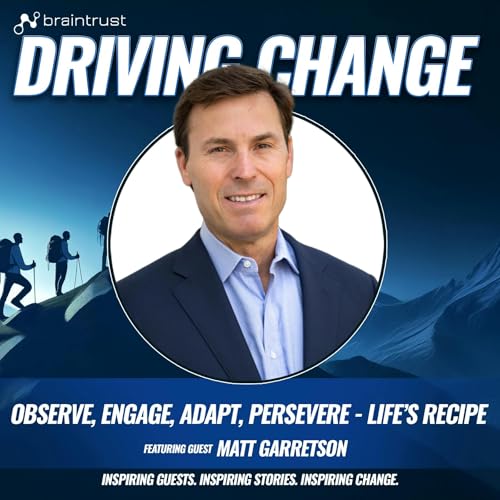From BMX tracks to the Iditarod trail, and from Yale Law to global justice reform, Matt Garretson’s life is a masterclass in resilience, curiosity, and purpose-driven innovation. In this episode, Jeff Bloomfield sits down with Matt to explore how his unique blend of risk-taking, compassion, and intellectual rigor led him to reshape the legal services sector, build businesses that impact thousands, and embark on extreme adventures that test the limits of human endurance. Whether it’s resolving billion-dollar settlements, pioneering AI in the legal industry, or pedaling 1,000 miles across frozen Alaska, Matt’s story is proof that the best results come from observing, engaging, adapting, and persevering. His daily formula: “My guiding mantra each day was that I must be methodical about observing (all data re terrain, weather, gear, etc.), engaging (with the underlying assumptions derived from those observations), adapting (because everything changes constantly when executing in an unpredictable/uncontrolled environment), persevering (having faith/confidence that i have the body, mind and spirit to accomplish the daily goals if i stay methodical about this loop). I broke each day into hour segments meaning for instance i didnt plan for 60 miles or 15 hours each day….i just needed to make it for instance from 9 AM to 10AM…then i can make it to 11 and if I made it to 11 then certainly 12 was possible etc. 18 days later I was in Nome!!!” This isn’t just a story about legal innovation or adventure sports — it’s a blueprint for high-stakes decision-making in life and business. Matt’s “Observe, Engage, Adapt, Persevere” framework, forged in the crucible of both courtroom battles and Arctic winds, is a practical leadership model for anyone navigating uncertainty. Leaders, entrepreneurs, and high-performers will walk away with actionable insights on risk management, building trust in complex negotiations, integrating AI into human-centered processes, and maintaining clarity when the stakes are high and the variables keep changing. Origin shapes destiny — The combination of his father’s risk-taking spirit and his mother’s intellectual curiosity formed the foundation of Matt’s worldview. Unconventional paths have power — Yale undergrad + night law school created a rare blend of elite theory and gritty pragmatism. Faith in action — Matt’s theology degree grew out of reconciling the good and harm he saw in organized religion. Neutrality is a business model — Creating fair, transparent systems for complex legal settlements can transform entire industries. AI accelerates trust — Tools like Pattern Data and Jane are reshaping how the legal profession processes and shares information. Adventure as a leadership lab — Extreme endurance events sharpen decision-making and adaptability. Observe, Engage, Adapt, Persevere — A simple yet powerful framework for survival and success. Moisture management matters — Small, counterintuitive habits can make or break long-term success in any high-stakes environment. Find the middle ground — In negotiations, you’ve likely reached fairness when both sides are slightly unhappy but see the logic. Impact over income — Matt’s latest venture in Guatemala proves that business growth and social good can be inseparable. 00:00 – Intro & guest setup 05:35 – Matt’s origin story: risk-taking father, intellectual mother 09:00 – Discovering law as a second-phase career 11:55 – Theological studies: reconciling faith and harm 17:28 – The birth of a neutral legal administrator 21:11 – World Trade Center, BP Oil Spill, and mass tort work 27:39 – Truth, accountability, and finding reliable sources 31:44 – AI’s role in transforming the legal industry 39:23 – Epic adventures: Great Divide, Baja Divide, Iditarod 45:58 – The Observe–Engage–Adapt–Persevere model 53:48 – Burnbright: blending business, social impact, and job creation
続きを読む
一部表示
 42 分
42 分 47 分
47 分 57 分
57 分 43 分
43 分 59 分
59 分 46 分
46 分 50 分
50 分 2025/06/3051 分
2025/06/3051 分
